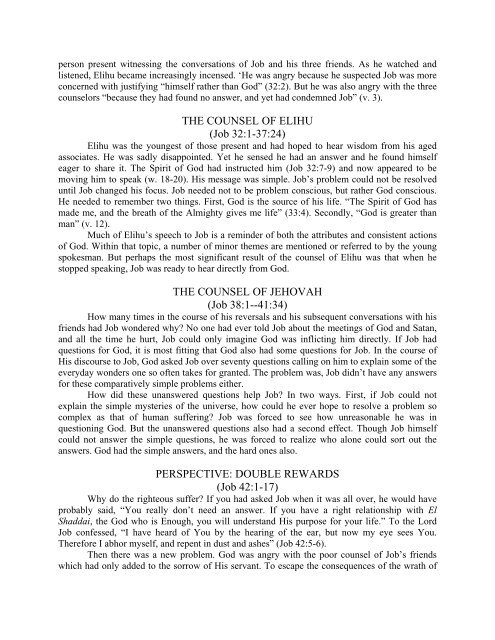A Journey Through The Old Testament - Elmer Towns
A Journey Through The Old Testament - Elmer Towns
A Journey Through The Old Testament - Elmer Towns
You also want an ePaper? Increase the reach of your titles
YUMPU automatically turns print PDFs into web optimized ePapers that Google loves.
person present witnessing the conversations of Job and his three friends. As he watched and<br />
listened, Elihu became increasingly incensed. ‘He was angry because he suspected Job was more<br />
concerned with justifying “himself rather than God” (32:2). But he was also angry with the three<br />
counselors “because they had found no answer, and yet had condemned Job” (v. 3).<br />
THE COUNSEL OF ELIHU<br />
(Job 32:1-37:24)<br />
Elihu was the youngest of those present and had hoped to hear wisdom from his aged<br />
associates. He was sadly disappointed. Yet he sensed he had an answer and he found himself<br />
eager to share it. <strong>The</strong> Spirit of God had instructed him (Job 32:7-9) and now appeared to be<br />
moving him to speak (w. 18-20). His message was simple. Job’s problem could not be resolved<br />
until Job changed his focus. Job needed not to be problem conscious, but rather God conscious.<br />
He needed to remember two things. First, God is the source of his life. “<strong>The</strong> Spirit of God has<br />
made me, and the breath of the Almighty gives me life” (33:4). Secondly, “God is greater than<br />
man” (v. 12).<br />
Much of Elihu’s speech to Job is a reminder of both the attributes and consistent actions<br />
of God. Within that topic, a number of minor themes are mentioned or referred to by the young<br />
spokesman. But perhaps the most significant result of the counsel of Elihu was that when he<br />
stopped speaking, Job was ready to hear directly from God.<br />
THE COUNSEL OF JEHOVAH<br />
(Job 38:1--41:34)<br />
How many times in the course of his reversals and his subsequent conversations with his<br />
friends had Job wondered why? No one had ever told Job about the meetings of God and Satan,<br />
and all the time he hurt, Job could only imagine God was inflicting him directly. If Job had<br />
questions for God, it is most fitting that God also had some questions for Job. In the course of<br />
His discourse to Job, God asked Job over seventy questions calling on him to explain some of the<br />
everyday wonders one so often takes for granted. <strong>The</strong> problem was, Job didn’t have any answers<br />
for these comparatively simple problems either.<br />
How did these unanswered questions help Job? In two ways. First, if Job could not<br />
explain the simple mysteries of the universe, how could he ever hope to resolve a problem so<br />
complex as that of human suffering? Job was forced to see how unreasonable he was in<br />
questioning God. But the unanswered questions also had a second effect. Though Job himself<br />
could not answer the simple questions, he was forced to realize who alone could sort out the<br />
answers. God had the simple answers, and the hard ones also.<br />
PERSPECTIVE: DOUBLE REWARDS<br />
(Job 42:1-17)<br />
Why do the righteous suffer? If you had asked Job when it was all over, he would have<br />
probably said, “You really don’t need an answer. If you have a right relationship with El<br />
Shaddai, the God who is Enough, you will understand His purpose for your life.” To the Lord<br />
Job confessed, “I have heard of You by the hearing of the ear, but now my eye sees You.<br />
<strong>The</strong>refore I abhor myself, and repent in dust and ashes” (Job 42:5-6).<br />
<strong>The</strong>n there was a new problem. God was angry with the poor counsel of Job’s friends<br />
which had only added to the sorrow of His servant. To escape the consequences of the wrath of
















